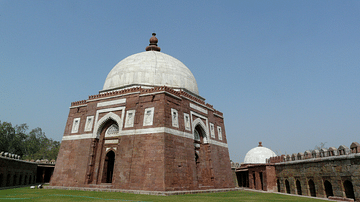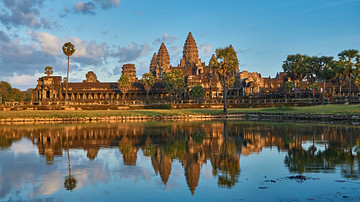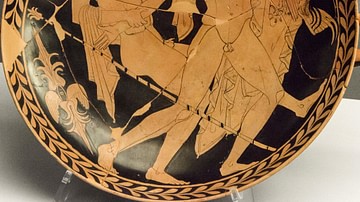Search
Search Results

Definition
Tughlaq Dynasty
The Tughlaq dynasty (also spelt Tughluq), ruled the Delhi sultanate from 1320 to 1413. Followed by the Khalji dynasty and preceded by the Sayyids, the Tughlaq dynasty formed an important period in the history and culture of the Sultanate...

Definition
Horus
Horus is the name of a sky god in ancient Egyptian mythology which designates primarily two deities: Horus the Elder (or Horus the Great), the last born of the first five original gods, and Horus the Younger, the son of Osiris and Isis...

Definition
Early Dynastic Period In Egypt
The Early Dynastic Period in Egypt (c. 3150 - c. 2613 BCE) is the beginning of the historical era of the country during which the regions of Upper Egypt (south) and Lower Egypt (north) were united as one country under a centralized government...

Definition
Angkor Wat
Angkor Wat is a temple complex in the province of Siem Reap, Cambodia originally dedicated to the Hindu god Vishnu in the 12th century CE. It is among the largest religious buildings ever created, second only to the Temple of Karnak at Thebes...

Article
Lugalbanda and the Anzud Bird
Lugalbanda and the Anzud Bird is a Sumerian myth dated to the Ur III Period (2047-1750 BCE) featuring the hero-king of Uruk, Lugalbanda, father of Gilgamesh, in his younger years as an honorable officer in the army. Lugalbanda's purity of...

Definition
Ancient Persian Culture
Ancient Persian culture flourished between the reign of Cyrus II (The Great, r. c. 550-530 BCE), founder of the Achaemenid Persian Empire, and the fall of the Sassanian Empire in 651 CE. Even so, the foundations of Persian culture were already...

Definition
God
God' is the common word for the identity of a higher being in the universe beyond our world, the creator of all known existence, and who rules in conjunction with lower gradients of divinity (angels). In Greek, theikos ("divine") meant to...

Definition
Thoth
Thoth is the Egyptian god of writing, magic, wisdom, and the moon. He was one of the most important gods of ancient Egypt alternately said to be self-created or born of the seed of Horus from the forehead of Set. As the son of these two deities...

Definition
Trinity
The Christian doctrine of the Trinity (from the Latin trinus, meaning "threefold") professes that there is one God, but three eternal and consubstantial persons (aspects): the Father, the Son, and the Holy Spirit. The Father is the God of...

Definition
Ganymede
Ganymede (pronounced GAH-nuh-meed) is a youth in Greek mythology who is abducted by Zeus because of his great beauty and brought to Mount Olympus to serve as cupbearer. The story first appears in Homer’s Iliad without any suggestion of a...